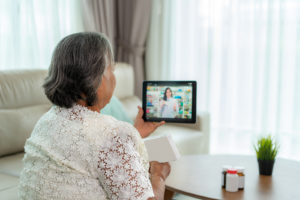Taskforce on Telehealth Policy: Virtual Medical Home Proposal
October 5, 2020 · Frank Micciche
We have recently heard from a couple of close and valued allies in the primary care movement with concerns about a proposed pilot program included in the final report of the Taskforce on Telehealth Policy, which NCQA helped convene. We take these concerns seriously and want to respond publicly so everyone is clear on our continued commitment to the essential role of primary care in our healthcare system.
The recommendation in question has to do with the concept of “virtual medical homes.” Specifically, the report calls on CMS to:
“(D)evelop and pilot a program that empowers and supports patients receiving care remotely. Patients opting to partake in this virtual medical home model would have access to designated patient navigators and other tools to maximize data sharing, care coordination, patient experience and outcomes. The program should be designed to complement and enhance any existing care coordination or patient-centered medical home services in place and to fully integrate remote care into the health care system.”
 The last sentence is, of course, the most important and should make clear that this limited experiment is designed to strengthen the PCMH models already in place across the country. Of course, NCQA maintains the largest PCMH recognition program in the country and we are extremely proud of the nearly 70,000 professionals that currently hold this status. We support efforts to spread and amplify the benefits of the concept as broadly as possible—particularly for vulnerable and underserved populations.
The last sentence is, of course, the most important and should make clear that this limited experiment is designed to strengthen the PCMH models already in place across the country. Of course, NCQA maintains the largest PCMH recognition program in the country and we are extremely proud of the nearly 70,000 professionals that currently hold this status. We support efforts to spread and amplify the benefits of the concept as broadly as possible—particularly for vulnerable and underserved populations.
The pilot would be available to those who receive much or all of their care remotely. This population is digitally-connected in a way that may offer opportunities to leverage that technology to improve care coordination and outcomes. The taskforce also urges CMS to enlist community health workers and community-based organizations as patient navigators, provide higher levels of service for those with complex needs and clearly align and enumerate payments, roles and responsibilities for each party.
Each of these provisions should boost the benefits already achieved via PCMHs where they are in place. We have no doubt that innovative PCMHs would maximize the benefits of such a pilot and would expect the integration of existing care coordination models to be paramount, as recommended in the taskforce report. But where they don’t exist, and where telehealth is a significant source of care, we think it is worth exploring how the virtual model might improve outcomes and patient experience.
We appreciate the opportunity to explain the taskforce’s recommendation in more detail and look forward to working with our fellow primary care champions to continue to strive for the best care possible.








